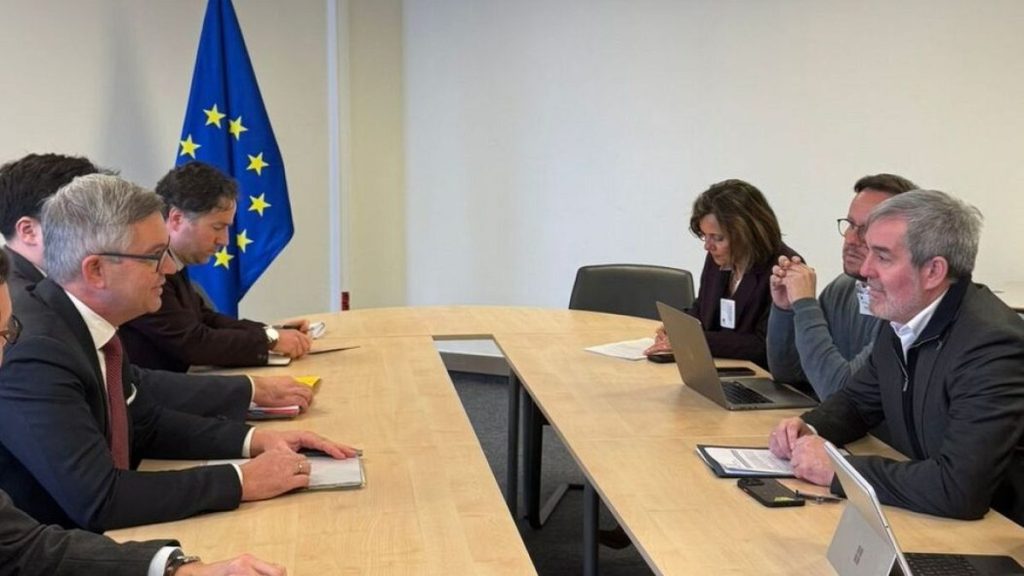Summarize this content to 2000 words in 6 paragraphs in Arabic
Fernando Clavijo met Home Affairs Commissioner Magnus Brunner in Strasbourg. “When you close one door, migrants exit from another.”
ADVERTISEMENTThe Canary Islands suffers from less focus from the EU than the Mediterranean in relation to irregular migration, despite experiencing the largest number ever of arrivals by sea, the island’s regional government’s President Fernando Clavijo said during a meeting with Home Affairs Commissioner Magnus Brunner in Strasbourg on Tuesday.“We demand solidarity because migrants are not landing in the Canary Islands or Spain; they are landing in Europe,” Clavijo told Euronews before the meeting, during which Brunner assured him that he would travel to the Canary Islands to assess the situation.In an interview with Euronews, the Spanish region’s president claimed that the EU has been focusing on addressing the migration issue in the Mediterranean Sea while ignoring his territory.“This works like communicating vessels: the EU has shielded the Mediterranean, and when you close a door, migrants exit from another,” he argued. “Now we have an accumulation of people ready to sail from countries like Morocco, Gambia, Senegal, and especially Mauritania. We ask to be treated with the same measures adopted for the Mediterranean.”Indeed, the so-called “Atlantic route” or “Western Africa route” saw almost 47,000 arrivals in 2024, an increase of 18% compared to 2023. According to NGO Caminando Fronteras, 9,757 people died in 2024 along this route, while the International Organization for Migration (IOM) recorded 1,062 victims.This increase occurred as flows of irregular migrants decreased along several other routes to Europe, marking a significant 38% drop in irregular border crossings into the EU in 2024 compared to the previous year.While some countries like Italy or Greece saw fewer people irregularly crossing their borders or landing on their shores, the Canary Islands face “absolute overflow”, as Clavijo described it.Currently, migrants mainly arrive in El Hierro, the westernmost of the Canary Islands. Adults remain on average 10–15 days in the archipelago before being transferred to mainland Spain. However, unaccompanied minors are hosted where they arrive, as the Spanish constitution assigns responsibility for them to each regional community.At present, Canary Islands authorities are hosting 5,812 unaccompanied minors, a thousand of whom are expected to be granted refugee status. “It is unfair that only one government has to bear all the pressure without knowing how many people will come or for how long,” Clavijo said, emphasizing that El Hierro Island has a population of 10,000 but saw almost 30,000 arrivals last year. “Although the Canarian people have a history of emigration and understand what it means, there is already some discontent.”Distribution of migrants and Frontex on African shoresTo alleviate pressure on his islands, Fernando Clavijo has specific requests for Madrid and Brussels. On a national level, he wants to establish an automatic distribution mechanism for migrants as soon as the reception capacity of a regional community is exceeded. Additionally, he calls for an “extraordinary distribution” to relocate a significant number of minors and the allocation of adequate financial resources from the central government to address the upcoming flows.If Pedro Sánchez’s government fails to provide solutions, the relationship with Madrid will deteriorate, and tensions will rise, Clavijo warned. The Canary Islands government claims it only received €50 million to manage the hosting of unaccompanied minors, while the resources needed amount to €184 million, he claimed.Clavijo belongs to the regional party Coalición Canaria, and his coalition includes the centre-right Partido Popular, while Prime Minister Sánchez leads PSOE, Spain’s socialist party.At the European level, Clavijo’s main requests include redistributing migrants arriving in the Canary Islands among EU member states, deploying the European Border and Coast Guard (Frontex) to the Atlantic islands, and working with African countries to prevent departures. “Distributing 5,800 minors within Europe is a perfectly manageable number. But concentrating all of them in a fragmented and remote territory makes it impossible to adequately care for them,” he stated.Clavijo hopes the EU can strike a deal with Western African countries, similar to agreements with Tunisia or Egypt. He noted that the €210 million promised to Mauritania by Ursula von der Leyen one year ago as part of a partnership has yet to reach the country.In his view, these deals should focus more on developing local economies than merely preventing people from leaving their countries. “There will be no walls or border protections strong enough to stop people from seeking a future,” he said.ADVERTISEMENTClavijo also advocates for sending Frontex officials to Western African countries and Canary Island shores to save lives by preventing departures in the former and rescuing people at sea in the latter.However, deploying the EU Coast Guard to a specific area requires a request from a competent national government, which Spain has yet to make. Brunner promised Clavijo he would discuss the matter with Spanish authorities at a meeting scheduled for February 17.Frontex’s presence in a third country is more complex to arrange, as it requires a working agreement between the EU and the country, approved by the Council and the European Parliament. Currently, the only African states where Frontex can operate are Nigeria and Cape Verde.
rewrite this title in Arabic EU focus on irregular migration in Mediterranean ignores Canary Islands, claims president
مقالات ذات صلة
مال واعمال
مواضيع رائجة
النشرة البريدية
اشترك للحصول على اخر الأخبار لحظة بلحظة الى بريدك الإلكتروني.
© 2025 جلوب تايم لاين. جميع الحقوق محفوظة.


